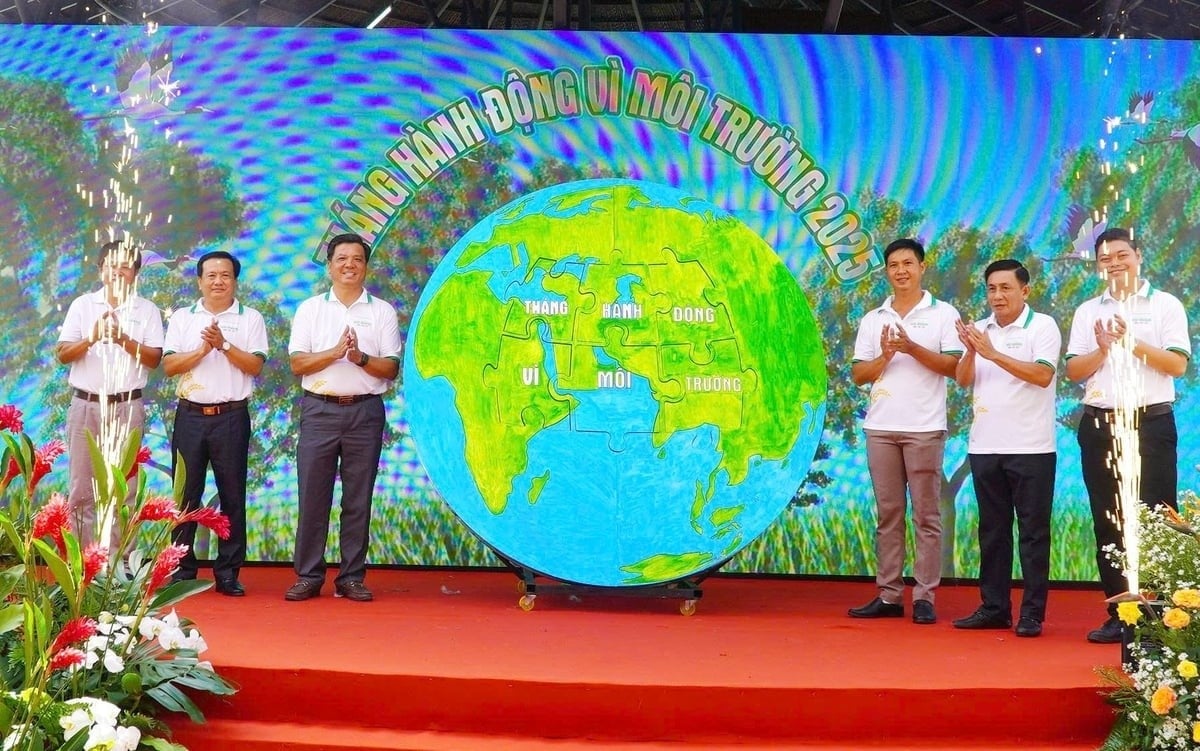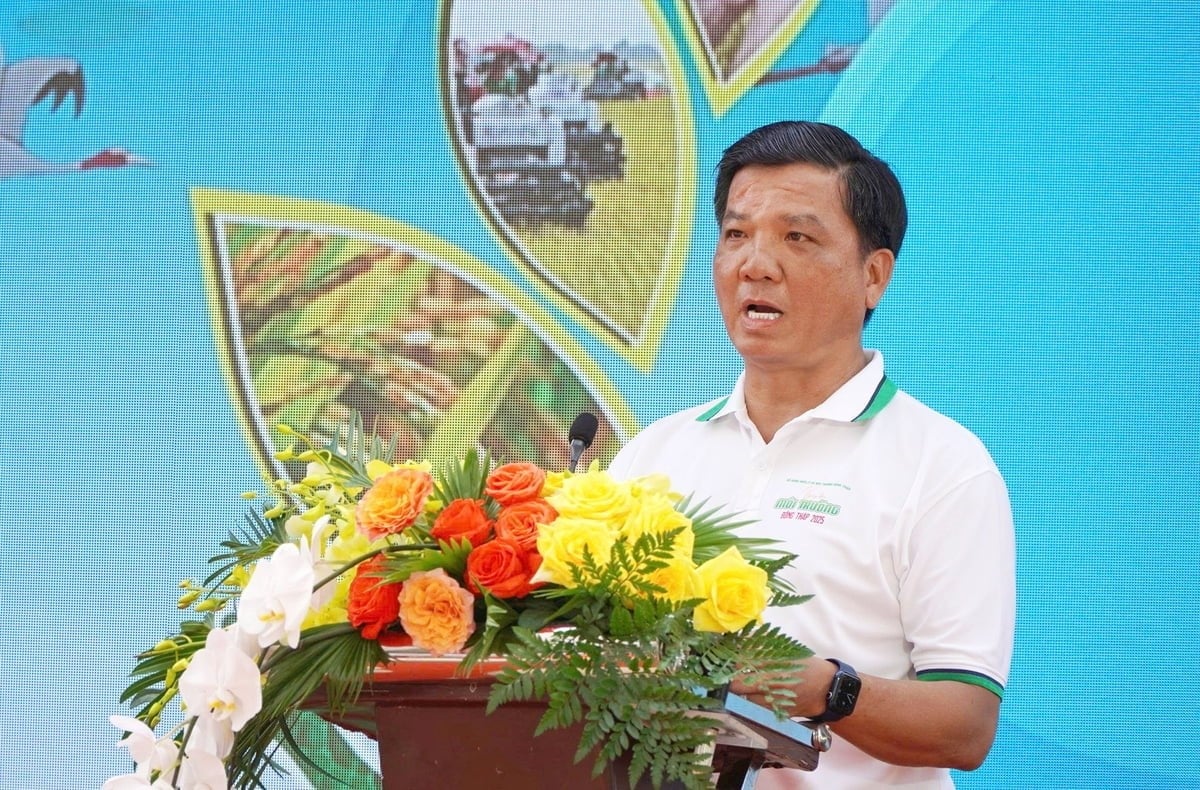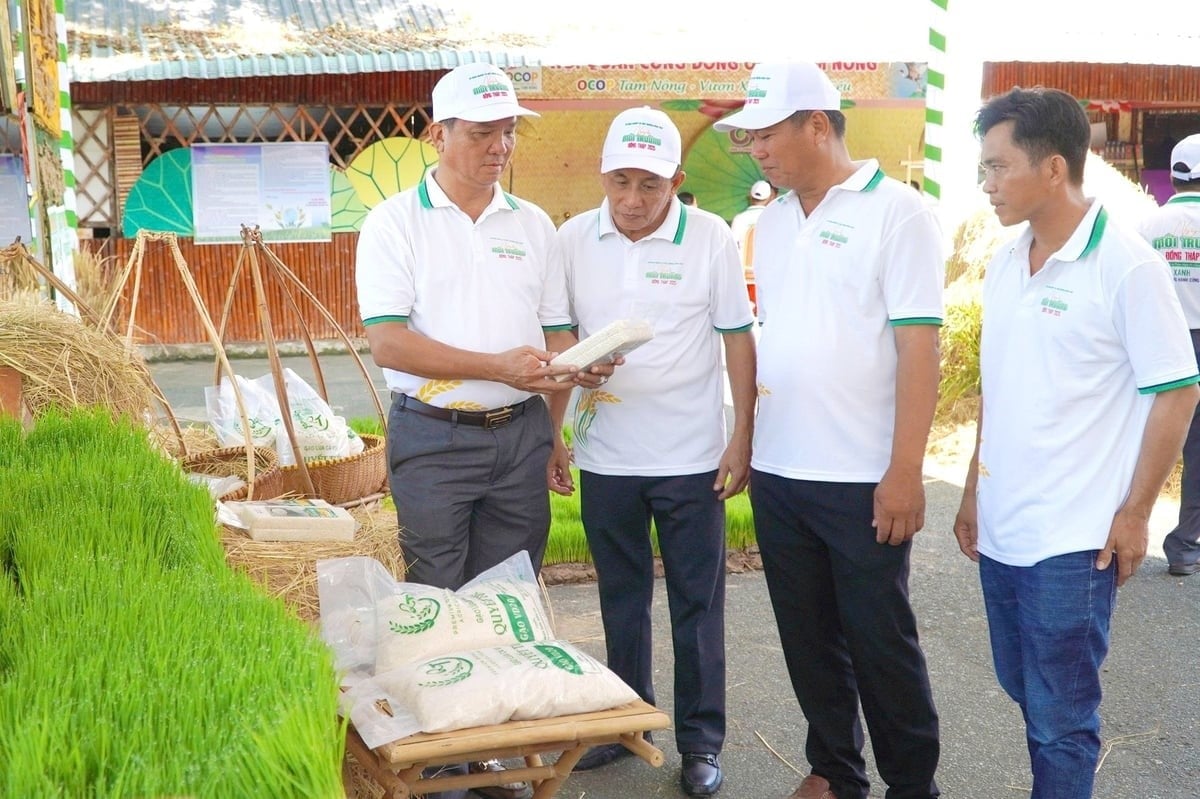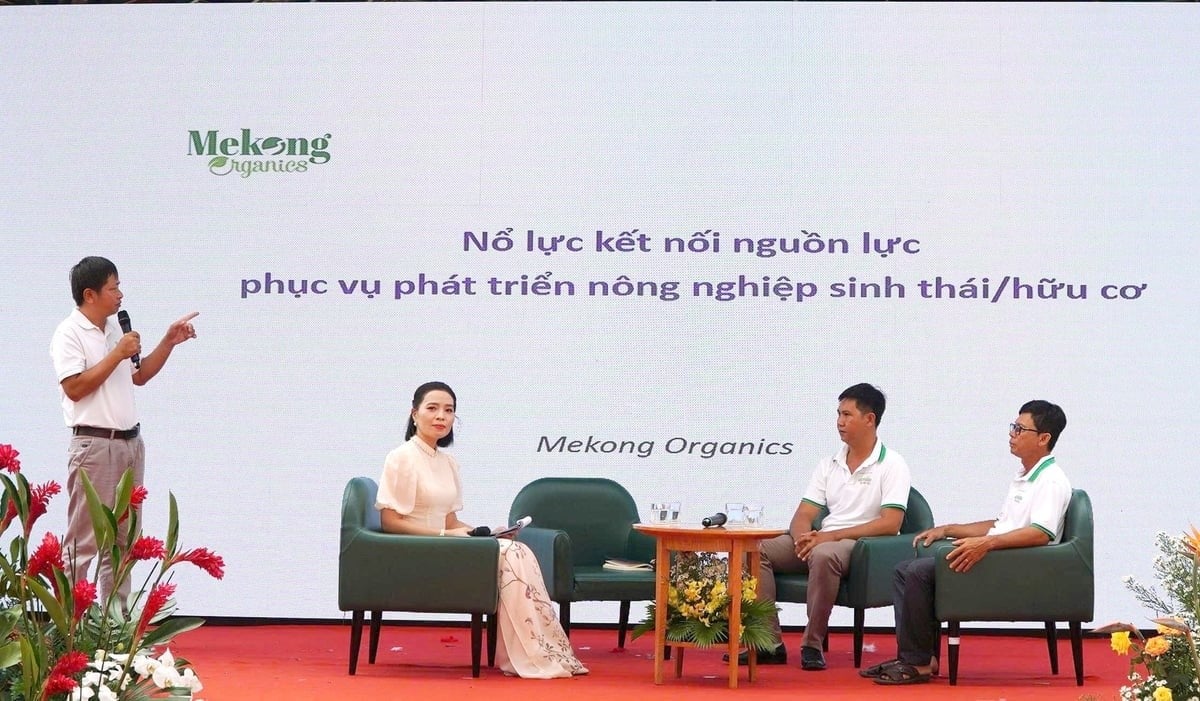December 31, 2025 | 19:51 GMT +7
December 31, 2025 | 19:51 GMT +7
Hotline: 0913.378.918
December 31, 2025 | 19:51 GMT +7
Hotline: 0913.378.918

Delegates performed the ceremony in response to the 2025 Action Month for the Environment. Photo: Le Hoang Vu.
In response to World Environment Day (June 5) and the 2025 Action Month for the Environment, on the morning of June 5, the Department of Agriculture and Environment of Dong Thap Province held a provincial environmental meeting at the Tram Chim National Park tourist area (Tam Nông district) under the theme “Live Green – Join Hands for a Green Economy.”
According to Mr. Le Chi Thien, Director of the Department of Agriculture and Environment of Dong Thap Province, this is an opportunity for all of us to listen to the voice of nature, from rivers and rice fields to rare bird species like Sarus cranes, to reflect and act for a greener, cleaner, and more sustainable Dong Thap.
Protecting the environment today is not only about saving birds, cranes, trees, or water, but also about safeguarding the lives, health, and happiness of ourselves and future generations. He also called on farmers, especially rice growers in the buffer zone of Tram Chim, to continue pursuing agroecology, such as avoiding the use of pesticides and chemical fertilizers and ending field burning.

Mr. Le Chi Thien, Director of the Department of Agriculture and Environment of Dong Thap Province, speaks at the launch ceremony of the 2025 Action Month for the Environment. Photo: Le Hoang Vu.
Although farmers may initially face difficulties and unfamiliarity, ecological agriculture will, in the long term, help reduce production costs, make it easier to sell agricultural products, and promote healthier lives. This is not only a solution for sustainable crops but also a way to help restore our “natural home.”
For cooperatives and businesses, waste and by-products can become valuable resources if utilized properly. Turning the useless into the useful is the path toward the sustainable development of a circular and green economy.
Officials, unions, and schools are urged to lead by example. To be more specific, they should avoid using single-use plastic water bottles in meetings and conferences; implement waste classification at the source, starting right in offices and classrooms; and prioritize environmentally friendly materials and supplies.
The theme of this year's World Environment Day is “Beat Plastic Pollution.” To live in harmony with nature, the leadership of the Department of Agriculture and Environment of Dong Thap Province called on everyone to begin by living in harmony with themselves, with their communities, and with the invaluable heritage of their homeland, which is Dong Thap’s abundant nature.

Delegates visit the promotional space for the project developing 1 million hectares of high-quality, low-emission rice combined with ecological and circular agriculture models. Photo: Le Hoang Vu.
“Living green is not just a responsibility but also a benefit. Living green is not only for nature but also for our common home, for future generations, and for a more sustainable national development. Living green is not a slogan; it is the right choice to protect health, create sustainable livelihoods, and improve the quality of life for every household, every community, and the entire country. When the environment is protected, production is cleaner, and consumption is smarter, farmers, businesses, and government all benefit,” affirmed Mr. Le Chi Thien.
Within the framework of the ceremony, a seminar titled “Journey of Tram Chim Ecological Rice” was held. At the event, speakers shared insights about the organic rice production model at Quyet Tien Agroecology Cooperative, emphasizing the economic efficiency of organic rice farming compared to traditional methods. The core issues of building and replicating the model, as well as developing the Tram Chim Rice brand based on the ecological model, were also discussed by the speakers.

Seminar “Journey of Tram Chim Ecological Rice” at the event. Photo: Le Hoang Vu.
To promote green and sustainable development, particularly to contribute to the conservation and recovery of Sarus cranes at Tram Chim National Park, speakers encouraged farmers to boldly shift from traditional rice cultivation to ecological and organic rice farming. They urged producers to start with the smallest actions, including raising awareness about safe production, reducing the use of chemical fertilizers and pesticides toward restoring ecosystems, improving soil health and the environment, and ensuring the safety and health of both producers and consumers.
Translated by Thu Huyen

(VAN) From extensive shrimp ponds, baskets of don gathered on the mudflats, to boats carrying visitors to watch birds, all livelihoods here depend on clean water, green forests, and the calls of migratory birds.
/2025/12/26/0703-3-204813_117.jpg)
(VAN) Transparency in information and listening to local people have helped address ground clearance bottlenecks and build social consensus, thereby accelerating the progress of the JICA3 irrigation project.
/2025/12/27/0609-3-233846_327.jpg)
(VAN) The JICA3 project is expected to become a 'water shield,' helping control saltwater intrusion, proactively secure water resources, protect livelihoods, and promote sustainable development in coastal areas.
/2025/12/26/5654-3-164509_655.jpg)
(VAN) As Viet Nam makes strong commitments toward achieving net-zero emissions, controlling and reducing methane emissions in livestock production is increasingly becoming a mandatory requirement.

(VAN) 'People, Primates, Plants: Co-managing Biodiversity and Improving Livelihoods in Vietnam' (the PPP Project) is an international initiative implemented in Vietnam by BGCI, CEGORN, and ICRAF/World Agroforestry.

(VAN) Dak Nong established a risk-level zoning map for coffee, built a digital data platform for the sector, and promoted certified production in line with EUDR.
/2025/12/25/2709-1-211551_295.jpg)
(VAN) In response to the U.S. Marine Mammal Protection Act (MMPA), Gia Lai province is implementing many solutions to protect marine mammals and develop sustainable, responsible fisheries.